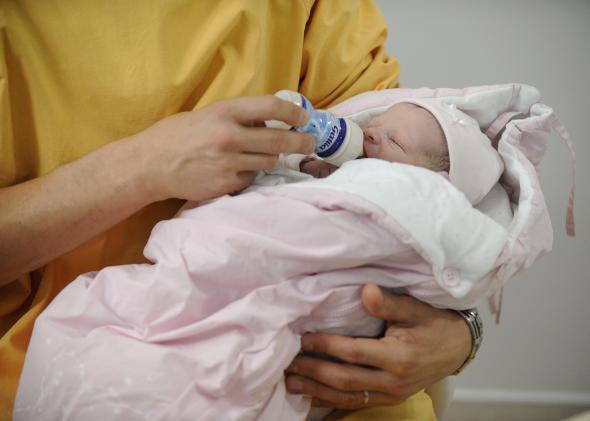A new study confirms what people like our own Hanna Rosin and Texas A&M professor Joan B. Wolf have been saying for years now: The benefits of breast-feeding have been overstated. The study, published in the journal Social Science & Medicine, is unique in the literature about breast-feeding because it looks at siblings who were fed differently during infancy. That means the study controls for a lot of things that have marred previous breast-feeding studies. As the study’s lead author, Ohio State University assistant professor Cynthia Colen, said in a press release, “Many previous studies suffer from selection bias. They either do not or cannot statistically control for factors such as race, age, family income, mother’s employment—things we know that can affect both breast-feeding and health outcomes.”
Colen’s study is also unique because she looked at children ages 4-14. Often breast-feeding studies only look at the effects on children in their first years of life. She looked at more than 8,000 children total, about 25 percent of whom were in “discordant sibling pairs,” which means one was bottle-fed and the other was breast-fed. The study then measured those siblings for 11 outcomes, including BMI, obesity, asthma, different measures of intelligence, hyperactivity, and parental attachment.
When children from different families were compared, the kids who were breast-fed did better on those 11 measures than kids who were not breast-fed. But, as Colen points out, mothers who breast-feed their kids are disproportionately advantaged—they tend to be wealthier and better educated. When children fed differently within the same family were compared—those discordant sibling pairs—there was no statistically significant difference in any of the measures, except for asthma. Children who were breast-fed were at a higher risk for asthma than children who drank formula.
Colen’s conclusion is the same one I came to when I wrote about a British pilot program that would pay women to breast-feed: Breast-feeding is good, but it shouldn’t be such a huge societal priority. As Colen put it, “We need to take a much more careful look at what happens past that first year of life and understand that breast-feeding might be very difficult, even untenable, for certain groups of women. Rather than placing the blame at their feet, let’s be more realistic about what breast-feeding does and doesn’t do.”
As more and more research comes out showing that the benefits of breast-feeding are modest at best, I’m starting to come around to the French feminist theorist Elisabeth Badinter’s views, which I once thought were overly radical and sort of bananas. I’m all for women breast-feeding if that is what is right for their families, but as Badinter does, I am finding the cultural push for all women to breast-feed, no matter how difficult it is, to be more and more oppressive. Hopefully this study will give women who can’t or don’t want to breast-feed for whatever reason more ammunition to tell the breast-is-best purists to piss off.
